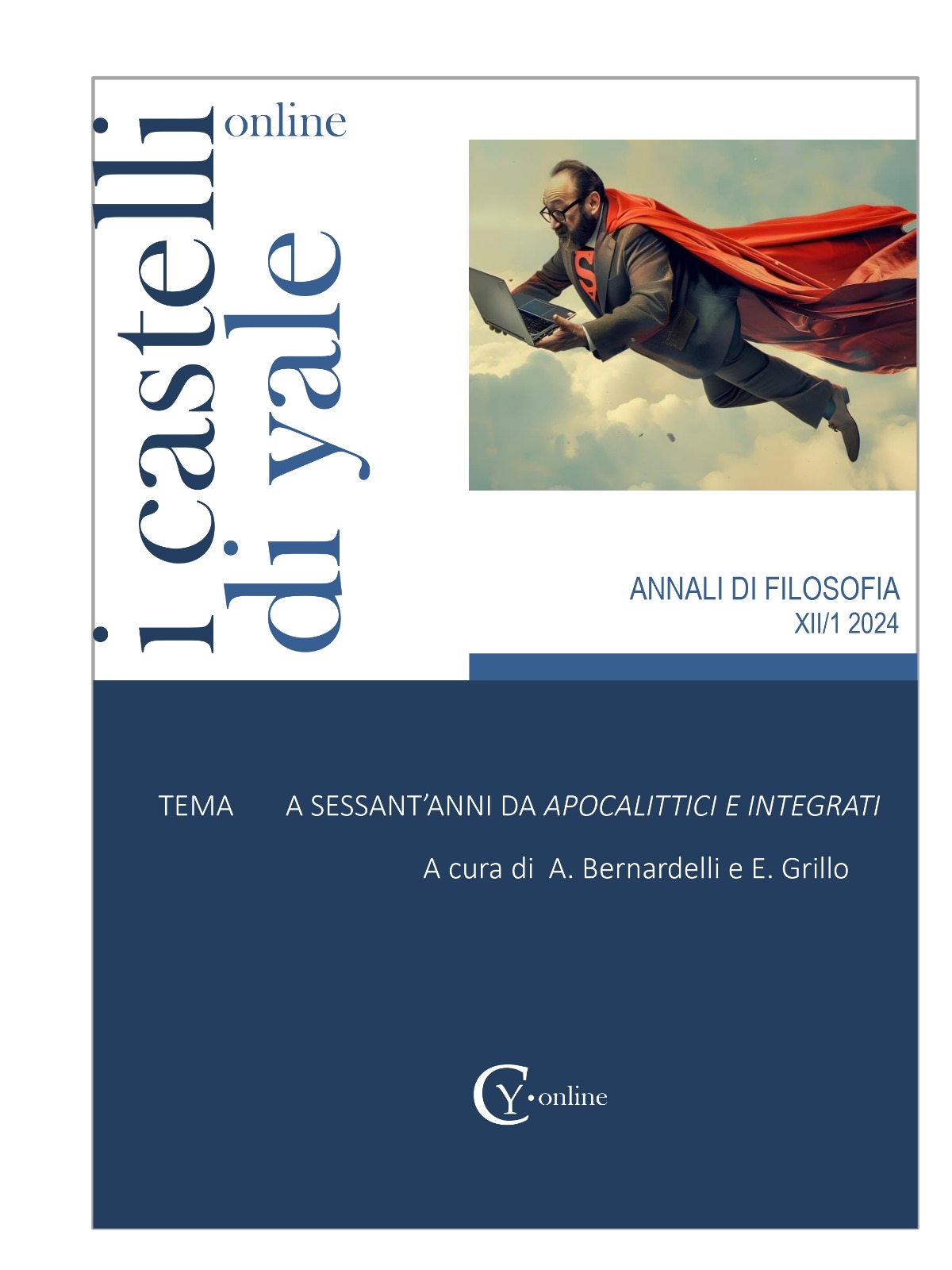Between Confucius and Kant: the case of Li Zehou
The Reception of Transcendental Philosophy in China
DOI:
https://doi.org/10.15160/2282-5460/2825Keywords:
Li Zehou, Kant, China, Critical Philosophy, Chinese Philosophy, Confucianism, MarxismAbstract
The article offers an overview of the reception of Kant's thought in China through the exposition given by Li Zehou, one of the most important scholars of the philosopher from Königsberg. Having set out some fundamental salient points of Chinese thought, the article then proceeds to analyse his most important work, "A new approach to Kant", enucleating its most significant aspects and highlighting the profound distance, harbinger of strident contradictions, between Kant's logical-transcendental matrix and the praxical-dialectical matrix typical of Confucianism. The article thus aims to trace not only the fundamental outcomes of Li's study on Kant, but also the relationship between this with Hegel, Marx and Confucian thought, attempting to reconstruct the genetic motivations of Li's transcendental proposal.
References
Ames, R.T. & Hall, D. (2024). Zhi, Routledge Encyclopedia of philosophy, accessibile online all’URL: https://www.rep.routledge.com/articles/thematic/zhi/v-1#.
Ames, R.T. & Jia, J. (2018), Li Zehou and Confucian Philosophy. Honolulu: University of Hawaii Press.
Cauvel, J. (1999). The Transformative Power of Art: Li Zehou's Aesthetic Theory. Phi-losophy East & West, 2, 150-173.
Cheng, A. (2010). Storia del pensiero cinese. A cura di A. Crisma. Torino: Einaudi.
Chong, W.L. (1999). Combining Marx with Kant: The Philosophical Anthropology of Li Zehou. Philosophy East and West, 2, 120-149.
Cassirer, E. (2016). Vita e Dottrina di Kant. A cura di E. De Toni. Roma: Lit Edizioni.
Fichte, J.G. (2005). Dottrina della scienza. 2ª esposizione del 1804. A cura di M.V. d’Alfonso. Milano: Guerini e associati.
Gatta, T. (2022). Lo sviluppo del lessico filosofico cinese moderno. Verona: Leo S. Olschki.
Graham, A.C. (1989). Disputers of the Tao: philosophical argument in Ancient China, La Salle (Illinois): Open Court.
Hegel, G.W.F. (2010). Lezioni sulla filosofia della storia. A cura di G. Bonacina e L. Si-chirollo. Roma-Bari: Laterza.
Kant, I. (2020). Critica della ragion pratica. A cura di C. Esposito. Milano: Bompiani.
Kant, I. (2021). Risposta alla domanda: che cos’è l’illuminismo?. In I. Kant, M. Fou-cault & J. Habermas, Che cos’è l’illuminismo. A cura di U. Curi. Milano-Udine: Mimesis.
Lambert, A. (2018). Determinism and the problem of human freedom. In Ames, R.T. & Jia, J. (a cura di), Li Zehou and Confucian Philosophy. Honolulu: University of Hawaii Press.
Lambert, A. (2021). Li Zehou: Synthesizing Kongzi, Marx, and Kant. In Elstein D. (a cu-ra di), Dao Companion to Contemporary Confucian Philosophy, New York: Springer.
Leys, S. (1998) (a cura di). I detti di Confucio. Milano: Adelphi.
Li, Z. & Lambert, A. (2019). A History of Classical Chinese Thought of Li Zehou. Lon-don: Routledge.
Li, Z. (1999). Subjectivity and "Subjectality": A Response. Philosophy East and West, 2, 174.
Li, Z., (2004). La Via della bellezza. A cura di A. Crisma. Torino: Einaudi.
Li, Z. (2016). A response to Michael Sandel and other matters. Trad. ing. di P. D’Ambrosio & R.A. Carleo III. Philosophy East and West, Vol. 66, No. 4, pp. 1068-1147.
-1147.
Li, Z., (2018a). A New approach to Kant. New York: Springer.
Li, Z. (2018b). Response to Paul Gauguin’s Triple question, in Ames, R.T. & Jia, J. (a cura di), Li Zehou and Confucian Philosophy, Honolulu: University of Hawaii Press.
Li, Z. (2023). The Humanist Ethics of Li Zehou. New York: Suny Press, ebook.
Lin, M. (1992). The Search for Modernity: Chinese Intellectual Discourse and Socie-ty, 1978-88 - The Case of Li Zehou. The China Quarterly, 132, 969-998.
Löwith, K. (2015). Significato e fine della storia. Trad. it. di F. Tedeschi Negri. Milano: Il Saggiatore.
Ming-Huei, L. (2017). Confucianism: Its Roots and Global Significance, Honolulu: Uni-versity of Hawai'i Press
Pohl, K.H. (2018). Western Learning for Substance, Chinese Learning for Application. In Ames, R.T. & Jia, J. (a cura di), Li Zehou and Confucian Philosophy. Honolulu: Univer-sity of Hawaii Press.
Rošker, J.S. (2018). Modern Confucian Epistemology: From Reasonto Intuition—And Back. In Ames, R.T. & Jia, J. (a cura di), Li Zehou and Confucian Philosophy. Honolulu: University of Hawaii Press.
Rošker, J.S. (2020). Becoming Human: Li Zehou's ethics. Leiden: Brill.
Downloads
Published
Issue
Section
License
Copyright (c) 2024 Cosimo Pastia

This work is licensed under a Creative Commons Attribution-NonCommercial-NoDerivatives 4.0 International License.


